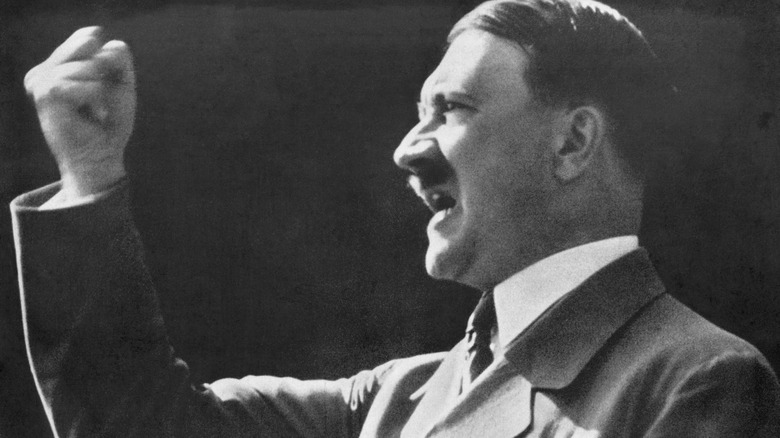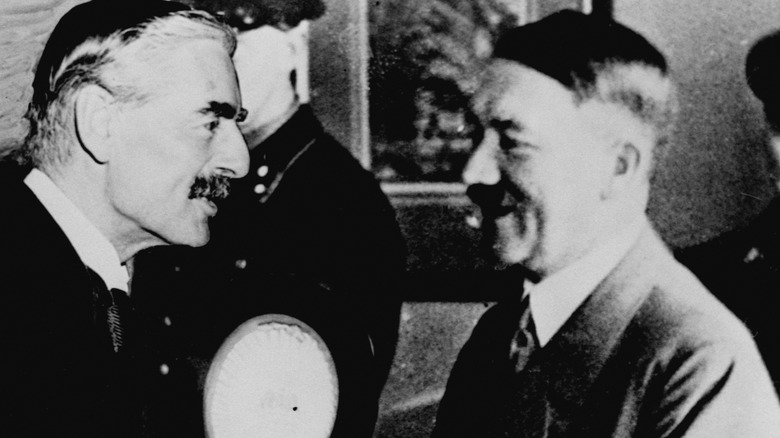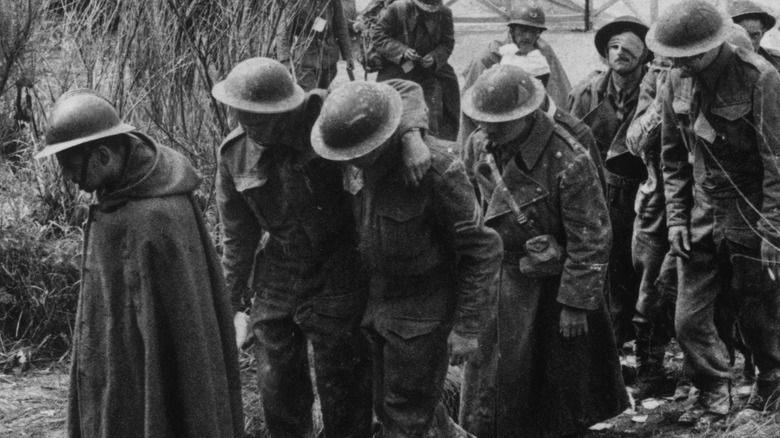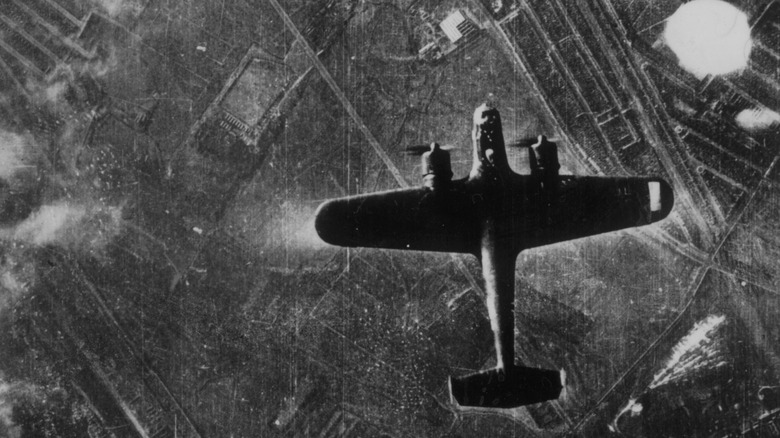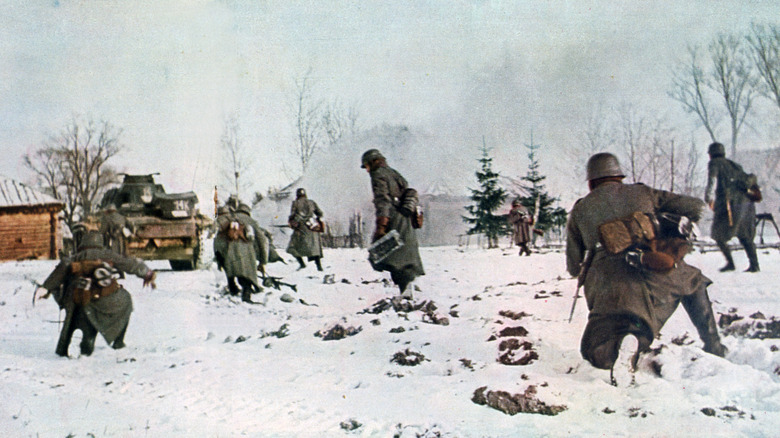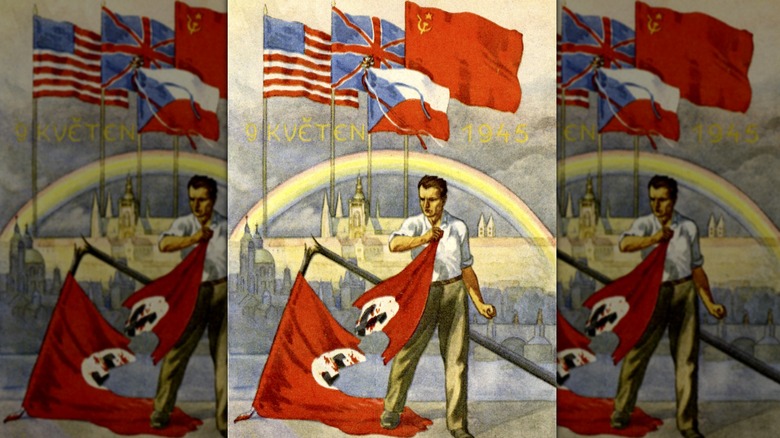Ways Hitler Could Have Won World War II
Within the subgenre of alternate history fiction, there is a popular subject: the victory of the Axis powers in World War II. These stories all approach the theories in their own way, but they share a dystopian vision of Nazi power persisting well into the 20th century. In these timelines, the United States fights its cold war against Germany, American delay lets the Nazis triumph in the second and third world wars, and the Axis powers conquer the entire globe. All the while, the Holocaust rages on.
As horrific as it would have been, the "what if" of their victory in World War II represents fertile ground for fiction writers and imaginative historians. Given the destruction triggered by the Axis powers in their relatively brief period of dominance and the Nazis' easily identified brand of evil in particular, they're naturally tempting antagonists in alternate history stories. And yet, they may never have stood a chance at winning once World War II truly became a world war. The conventional view (per History) is that, while Nazi military forces did threaten to overrun Europe, instead British resolve, Soviet manpower, and American economic force overrode the German military. To that view, others have added Nazi overconfidence and the weakness of Italy and Japan as decisive factors in the Axis defeat.
To win the war, Adolf Hitler and his followers would likely have had to avoid confrontation with the U.S. or Russia, or at least manage to force the latter into an early defeat. And there were moments early in his campaigns when Hitler could potentially have secured his Third Reich and even defeated his European adversaries.
Hitler could have avoided war altogether
"WarGames'" pithy line, "the only winning move is not to play," was said about thermonuclear war, but it could arguably apply to all armed conflict. And there was a point in the late 1930s where Adolf Hitler could have "won" World War II by avoiding it entirely. There was very little appetite for another European war among the leadership in Britain, France, and other nations otherwise disinclined to trust or partner with the Nazis. That attitude helped seal Czechoslovakia's fate; though they and France had a committed alliance, the new French government of 1938 determined they wouldn't be obligated to defend their partner, and Britain was unprepared to fight and wary of treading on the "self-determination" of the German-speaking Czechs Hitler aimed to bring into his fold (per Britannica). Allied reticence and Nazi chicanery ended with the Munich Agreement.
The German army still rolled into the Sudetenland as occupiers, and soon went further; Czechoslovakia was invaded in 1939. And yet, Hitler still could have avoided conflict with Britain and France and consolidated the territories he'd already annexed or conquered. Per The National Interest, Neville Chamberlain was prepared to follow up Munich with additional four-party talks. Had Hitler taken him up on that, Britain and France might not have committed to the defense of Poland, and Britain might have mediated between Germany and Poland over Hitler's remaining (public) territorial demands. But after the experience of Munich, Hitler no longer took the Allies seriously as a deterrent and plunged ahead.
The British almost caved to Hitler before Dunkirk
Wars can be won after a bitter fight that drives an enemy into submission. Or they can be won after an effective display of force convinces your enemy to come to the negotiating table before their losses become too great. In 1940, Adolf Hitler's Blitzkrieg tactics against Belgium, the Netherlands, and France overwhelmed the Allied forces. While French forces put up a brave fight to buy time for a retreat to Dunkirk, the situation seemed hopeless. Winston Churchill, who had by then become prime minister of Great Britain, was not yet firmly secure in his position. The other contender for the premiership, Lord Halifax, was the preferred choice of many. And Halifax, though far from a Nazi sympathizer, was convinced after the fall of France that Britain couldn't hope to deliver Germany a decisive defeat. He wanted to explore the possibility of peace.
The debate this sparked within Churchill's government has become known as the War Crisis of 1940. Halifax's proposal was to negotiate with Hitler through Italy, with the aim of securing British independence, possibly at the cost of some African and Mediterranean territory. Because of Halifax's level of support, Churchill had already had to cede ground to him, and he couldn't initially object to approaching the Italians. Others in the Cabinet objected even to opening discussions, and Churchill outmaneuvered Halifax in rallying support. But it was a tense and fluid situation, and had it gone the way of a settlement, Britain might have survived, but Hitler would have secured his hold on continental Europe.
The Battle of Britain was closely fought
The policy of appeasement and the aggressiveness of Nazi Germany and its fascist allies combined to shape their military reputation. But that reputation was, at least to some degree, that of a paper tiger. Rearmament, bellicose rhetoric, and the targeting of weak opponents gave Germany quick victories, but speed was key. Per the Stanford Report, Nazi Germany remained technologically superior to Great Britain, even as the Battle of Britain began in 1940.
Success for the Nazis in that battle hinged on another quick victory, which the British denied them. But there are historians who think that victory was within Adolf Hitler's grasp. A study released by the University of York found that had he started his campaign just three weeks earlier and limited his targets to RAF airfields, Adolf Hitler could have decimated Britain's air power. With the proviso that the statistical analysis of the hypothetical and actual odds of victory are impossible to nail down, the study found that such a blow might have left Britain with just a 10% chance of making it through the battle.
As it was, the Battle of Britain was not quite the underdog story it's often painted as. The Nazi war machine had done significant damage to the RAF in the Battle of France, but Britain's industrial strength and the RAF's talent pool soon made up the difference. Still, Hitler may yet have triumphed had he not switched from attacking the airfields to attacking the cities, giving the RAF needed time to rally.
A quicker invasion in Russia could have knocked them out of the war
There was no expectation that the non-aggression pact between Germany and the Soviet Union would last forever; Nazism and Stalinist Communism might be comparably abhorrent, but they were diametrically opposed ideologies. That the pact was signed at all came as a shock to many observers. One of the most baffling questions of World War II is Adolf Hitler's decision to disregard the pact and invade Soviet Russia in 1941, even if he viewed Eastern Europe as prime living space for the Germans and potentially enslaving the Slavs.
Bigotry and megalomania weren't Hitler's only reasons. According to the Imperial War Museum, Germany was facing resource shortages by that stage in the war. The non-aggression pact gave Hitler access to Russian food and fuel, but Hitler wagered that direct control over Soviet resources would improve Germany's position. He aimed for a quick win, employing the largest army ever assembled up to that time to sweep Russia with Blitzkrieg tactics. Operation Barbarossa got off to a good start; within six months, 5 million Russian soldiers were dead or in enemy hands (per the BBC).
The German advance exceeded even their own expectations. The generals pushed for an all-out attempt to take Moscow and break Russian spirit, which Hitler did consider (per Sea Lion Press). He might have taken the city, and had more resources, by starting a month sooner instead of invading Yugoslavia. And had he prepared for the possibility of a winter campaign, his armies might have had the equipment needed to endure a Russian winter and win.
Hitler needed the USA to stay out of the war
1941 may have been the pivotal year of World War II. By some estimations, it was the last point in the timeline where Adolf Hitler could realistically have won. Britain had withstood the Blitz, and the Russians recovered from early catastrophic losses to mount an entrenched resistance. But even with those setbacks, reporter Andrew Nagorski has written (via The Washington Post) that Nazi victory was still in the cards until the end of the year when Germany declared war on the United States.
Despite the Roosevelt administration's support for the British, isolationist and antiwar sentiment remained high in America in 1941. And while Hitler had an oral contract with Japan to join it in a war with the U.S., Germany was not obligated to do so. Hitler was not made aware of the attack on Pearl Harbor until after it had happened. The German foreign minister feared American involvement in the war. Without them, Britain and Russia still seemed manageable fronts, especially if (as it ultimately did not happen) Japan engaged the Soviets on their eastern shore.
Ultimately, Hitler assumed that the U.S. would declare war on him anyway, and beat them to the punch in December 1941. This brought America into both the Asian and European theaters of World War II and, in many estimations, sealed the fate of Nazi Germany.
